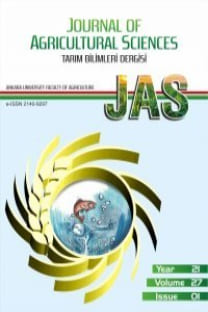Yabani Agrobacterium tumefaciens A281 Hattıyla Ayçiçeğinde Tümör Oluşumu
Helianthus annuus L., Agrobacterium tumefaciens, onkogenik, tümör oluşumu
Tumor Formation in Sunflower Using A281 Strain of Agrobacterium tumefaciens
___
- Alibert, B., O. Lucas, V. Gall and J. Kallerhoff, (1999). Pectolytic enzyme treatment of sunflower prior to wounding and cocultivation with Agrobacterium tumefaciens, enhances efficieny of transient beta glucuronidase expression, Phyiologia Plantarum 106:2, 232-237.
- Bidney, D., C. Scelonge, J. Martich, M. Burrus, L. Sims and G. Hoffman, 1992. Microprojectile bombardment of plant tissues increases transformation frequency by Agrobacterium tumefaciens. Plant Mol. Biol., 18: 301- 313.
- Escandon, A.S. and G. Hahne, 1991. Genotype and composition of culture medium are factors important for transformed sunflower (Helianthus annuus L) callus.Physiol. Plant., 81: 367-376.
- Pugliesi, C., P. Megale, F. Cecconi and S. Baroncelli, 1993.
- Evrett, N. P., K.E.P. Robinson and D. Mascarenhas, 1987. Genetic Engineering of Sunflower (Helianthus annuus), Bio/Technology, 5; 1201-1204 .
- Gaponenko, AK., IP.Voronina, Yu, D. Beletskii, AS. Konov and K.Skryabin, 1991.Effectiveness of the transformation of immature embriyos of sunflower (Helianthus annuus L.)1 Vsesoyuznyi simpozium Novye metody bioteknologii rastenii, Pushcino,123: 13-14.
- Grayburn, W.S. and B.A. Vick, 1995. Transformation of sunflower (Helianthus annuus L.) following wounding with glass beads. Plant Cell Rep., 14: 285-289. The hyper virulence of Agrobacterium tumefaciens A281 is encoded in a region of p Ti Bo542 outside of T- DNA.’’ J. Bacteriol., 168; 1291-1301.
- Jefferson, R.A. 1987. Assaying chimeric genes in plants: the GUS gene fusion system. Plant Mol. Biol. Rep. 5; 387- 405.
- Knittel, N., V. Gruger, G. Hahne and P. Lénéé, 1994. Transformation of sunflower (Helianthus annuus L.): A reliable protocol. Plant Cell Rep., 14: 81-86.
- Laparra, H., M. Burrus, R. Huonold, B. Damm, A.M. Bravo- Angel, R. Bronner and G. Hahne, 1995. Expression of foreign genes in sunflower (Helianthus annuus) L.) evaluation of three gene transfer methods. Euphytica, 85: 63-74.
- Moyne, A.L., D. Tagu, V. Thor, C. Bergounioux, G. Freyssinet and P. Gadal, 1989.Transformation calli obtained by direct gene transfer into sunflower protoplast. Plant Cell Rep., 8: 97-100.
- Murashige, T. and F. Skoog, 1962. A revised medium for rapid growth and bioassays with tobacco tissue cultures. Physiol. Plantarum.15; 473-497.
- Özcan, S. 1993. Tissue culture in pea and engineering a marker gene for specific expression in target cells for plant transformation. (Ph.D. Thesis), University of Leicester, U.K. Organogenesis and embryogenesis İN Helianthus tuberosus and in the interspecific hybrid Helianthus annuus x H. tuberosus. Plant Cell Tiss. Org. Cult., 33: 187-193.
- Schrammeijer, B., P.C. Sijmons, P.J.M. van den Elzen and A. Hoekema, 1990. Meristem transformation of sunflower via Agrobacterium. Plant Cell rep. 9: 55-60
- Yayın Aralığı: Yılda 4 Sayı
- Yayıncı: Halit APAYDIN
Pulluk Uç Demirlerindeki Aşınmaların Görüntü İşleme Tekniğinden Yararlanılarak Belirlenmesi
Karıncalar Hymenoptera: Formicidae ve Coccoidea Hemiptera: Sternoryncha Türlerinin İlişkileri
Sema TURGUTER, Selma ÜLGENTÜRK
İran Üçgülünde Trifolium resupinatum L. Bazı Bitkisel ve Tarımsal Özelliklerinin Belirlenmesi
Sema ERDEMLİ, Ergül ÇOLAK, Hayrettin KENDİR
Yabani Agrobacterium tumefaciens A281 Hattıyla Ayçiçeğinde Tümör Oluşumu
Buğday Tanelerinin Bazı Fiziksel Özelliklerinin Görüntü İşleme Tekniğiyle Belirlenmesi
Hande Yıldız DEMİRBAŞ, İlknur DURSUN
Akıncı Sulama Birliğinde Sulama Performansının Karşılaştırmalı Değerlendirilmesi
Gülper NALBANTOĞLU, Belgin ÇAKMAK
Irak’ta Yetiştirilen Bazı Ekmeklik Buğday Çeşitlerinde Kallus Oluşumu ve Bitki Rejenerasyonu
Altınova Tarım İşletmesinde Yetiştirilen Esmer Sığırların Süt ve Döl Verim Özellikleri
